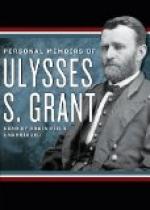Learning that Early was retreating south towards Lynchburg or Richmond, I directed that the 6th and 19th corps be got back to the armies operating against Richmond, so that they might be used in a movement against Lee before the return of the troops sent by him into the valley; and that Hunter should remain in the Shenandoah Valley, keeping between any force of the enemy and Washington, acting on the defensive as much as possible. I felt that if the enemy had any notion of returning, the fact would be developed before the 6th and 19th corps could leave Washington. Subsequently, the 19th corps was excepted form the order to return to the James.
About the 25th it became evident that the enemy was again advancing upon Maryland and Pennsylvania, and the 6th corps, then at Washington, was ordered back to the vicinity of Harper’s Ferry. The rebel force moved down the valley, and sent a raiding party into Pennsylvania which on the 30th burned Chambersburg, and then retreated, pursued by our cavalry, towards Cumberland. They were met and defeated by General Kelley, and with diminished numbers escaped into the mountains of West Virginia. From the time of the first raid the telegraph wires were frequently down between Washington and City Point, making it necessary to transmit messages a part of the way by boat. It took from twenty-four to thirty-six hours to get dispatches through and return answers would be received showing a different state of facts from those on which they were based, causing confusion and apparent contradiction of orders that must have considerably embarrassed those who had to execute them, and rendered operations against the enemy less effective than they otherwise would have been. To remedy this evil, it was evident to my mind that some person should have the supreme command of all the forces in the Department of West Virginia, Washington, Susquehanna, and the Middle Department, and I so recommended.




